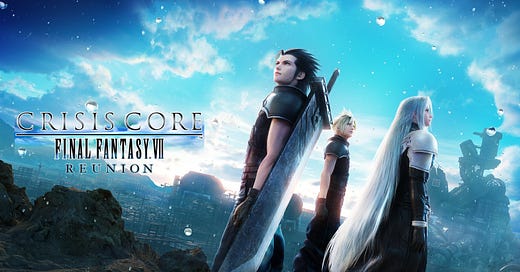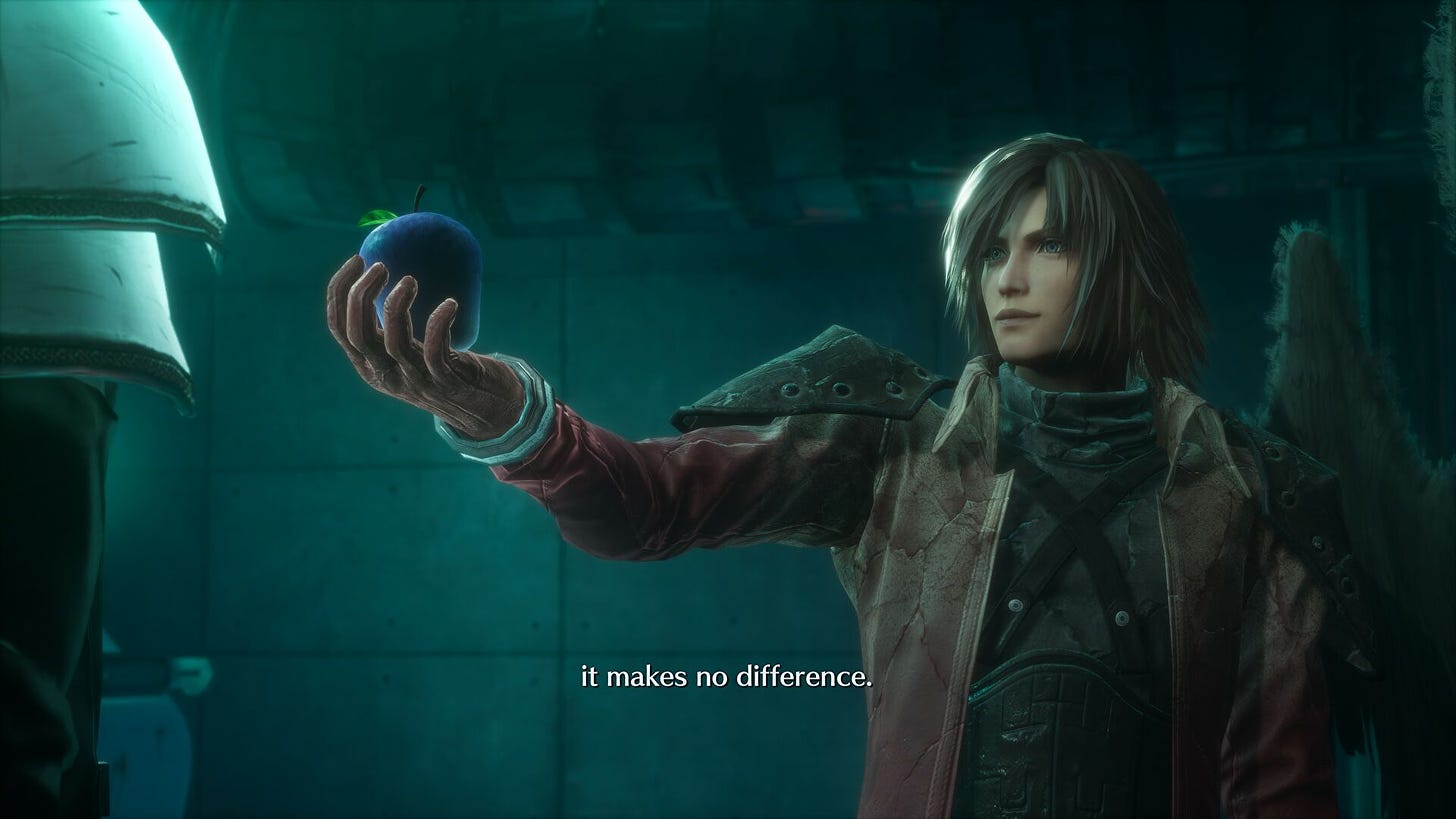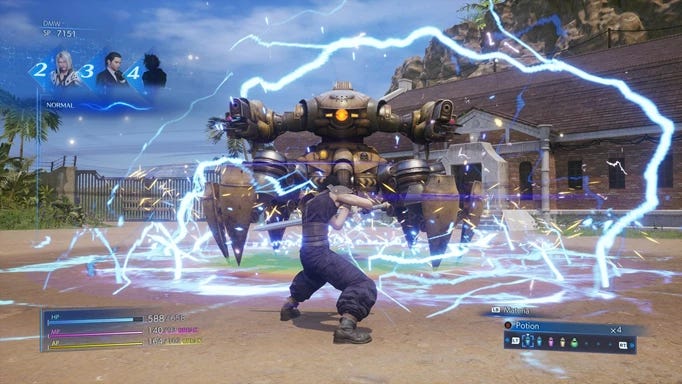Hola, amigos! We’re in your inbox again, this time with a look at Crisis Core: Final Fantasy VII Reunion. Like the try-hard arriving at a house party, we’re casually late with our review, but that’s not a bad thing if (like us) you aren’t always up on the latest news or releases. We’ve got a few things to chat about, but a quick heads-up first.
We have written about the idea of remakes and what that means to this game in particular, but that makes it impossible to not go into minor spoiler territory for the original game and any subsequent titles like Final Fantasy VII: Remake. It won’t be anything drastic (particularly considering FFVII is over 25 years old), but you have been warned. Luckily, if you want to here my initial reaction to playing the game, you can remain spoiler free by listening to our very first podcast.
Reunion- Remake or Remaster?
Crisis Core Reunion is a strange game, or rather it’s an intriguing remaster of a strange game. What even makes a game a remaster or a remake anyway? A quick Google search will come up with a variety of different responses, and in all honesty I don’t think there is a definitive answer.
As I see it, a remaster uses the previous version of the games’ assets with a mixture of graphical tweaks, quality of life updates and minimal new content to bring it to the modern era (e.g. Tony Hawk’s Pro Skater 1+2, which I talked about last year). On the other hand, a remake will be a ground up redesign of a game, with new gameplay features, additional content and occasionally entirely new mechanics (e.g. Resident Evil 2, which I also talked about briefly in a previous article).
Why bring this up then? CCR is almost undefinable even within the sketchy definitions that we have available to us. On one hand, it’s a complete graphical and UI overhaul (designed to match the aesthetics of Remake). The game has also had a complete audio re-record with all of the characters’ new voice actors, but weirdly it doesn’t change any of the cheesy dialogue or story material. The classic hallmarks of a remaster?
Usually you’d have to agree, but the combat has been heavily tweaked, to the point where it nearly feels like an entirely new game. Input lag, enemy AI and general difficulty levels are amongst some of the changes that have been improved. Perhaps the most controversial aspect of the original, the DMW system has seen the biggest changes, with it no longer being as intrusive and random. Battles now flow and provide exciting moments that aren’t completely ruined by RNG. Players are also now rewarded for performing well in battles, with a set percentage of HP, MP and AP being restored depending on certain criteria being met.
This remade combat is definitely for the better, I had a pretty fun experience getting to grips with the more streamlined setup that is in place, and there is definitely a lot of depth to the fighting and equipment/materia setups that you can create. Mixing and matching accessories allow you to gear your character in specific ways, almost to the point where you can make builds for Zack that are exclusively magic, damage or defense based to an equal standard. Having quick switches between gear set ups is also a really useful quality of life improvement.
Regardless of whether this game is a remake or remaster, the balance that has been struck in making CCR playable to a modern standard is fantastic. The improvements make it much more entertaining to play, with rich and rewarding action. At the same time it also retains almost everything that made the original what it was, but whether that is always a good thing is another matter…
Dumbapples, dumb story?
The main problem with both versions of Crisis Core is it’s storytelling. Let’s be frank, the dialogue mostly sucks and the general story beats are carried by the fact this is a FFVII prequel that includes three beloved characters (Zack, Sephiroth and Aerith) as part of it’s main cast. Genesis and Angeal, two SOLDIERs who a friends with Sephiroth, have potential to be interesting characters, but are ruined by sloppy writing. Their motives are dumb, their lore is dumb and they keep referencing some fruit called dumbapples (yes, really). They have a lot of untapped potential, especially Angeal who acts as Zack’s mentor, but ultimately their plot is uninteresting. You are essentially playing some chapters praying for Sephiroth to show up, which as an unapologetic FFVII fanboy is always a good time.
Zack is a likable lead though, and the story isn’t without it’s charms. He is the heart and soul of what is good about CCR, bringing a fresh but familiar look at this universe and it’s lore. I had a lot of fun playing as him this time around, helped by gameplay improvements, and felt myself warming up to his character a lot.
Anyone who has played either FFVII or FFVII:R will recognise him, but the former know a lot more about his future. If you have played the former, you will know why this story is important to the overall picture of what is happening in the latter. The DLC for the remake also hints at more Zack in the future, if at the very least in flashbacks or some aspects of the narrative.
You don’t have to have played the original FFVII to enjoy CCR, but you will experience some things in this that are not talked about until late into FFVII’s story. With the way FFVII:R is unfolding though, it feels like Square Enix want you to play this before Rebirth is released, and for any fan of the series I at least recommend taking the opportunity to recap the story with this version of the game. Zack and this storyline are almost more relevant than when it was released first time around.
Activating Combat Mode
Missions are where the game really shines though, and definitely provide a structure for something that could be revisited in future titles in the series. These missions, which Zack is performing as part of his duty as SOLDIER, are essentially 300 mini-dungeons filled with varying levels of enemies and difficulty.
Each one is set in an environment based on areas found in the original game, such as the Chocobo farm, dessert plains or mysterious caverns, and use familiar looking enemies. Much like the VR battles in FFVII:R, missions only have minor story relevance, yet prove really useful at providing opportunities for you to grind for EXP. They also provide a lot of loot and completion rewards, with varying degrees of usefulness.
Graded by difficulty, they provide the real combat challenges of the game, including some secret high level bosses, including a chance to face off against some of the game’s summons. You don’t have to complete them, but they are arguably the most fun parts of the game, and I spent hours playing through them. Smashing familiar enemies, in a FFVII setting, with a nu-metal sound track,? Count me in!
Overall Verdict
So is Crisis Core Reunion the perfect return to the FFVII universe? The slick sheen this version has been given makes this a worthwhile stop-gap for hardcore fans of the series or anyone who has completed FFVII:R. It provides insight into the future of the overall story, and will be a blast to play if you’re eager for Rebirth to arrive. It can’t completely gloss over the original’s shortcomings, particularly the dodgy script and suspect new characters, but at least the game play is now much more engaging.
Those of you on the fence should wait for this to arrive on a platform like Xbox Game Pass, PS+ or even for it to go on sale. However, if you love FFVII you will be pleasantly surprised by how addictive this game can be. I spent a solid 35ish hours on my run, but you could easily beat the main story in much quicker time if you just want a quick playthrough.







